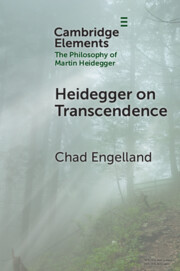Refine search
Actions for selected content:
191 results
Chapter 10 - Theory of Demonstration
-
-
- Book:
- Ockham’s <i>Summa Logicae</i>
- Published online:
- 04 September 2025
- Print publication:
- 18 September 2025, pp 210-230
-
- Chapter
- Export citation
Positive symptoms and their associations with life and trauma events among young adults in a first-episode psychosis clinic: qualitative analysis
-
- Journal:
- BJPsych Open / Volume 11 / Issue 5 / September 2025
- Published online by Cambridge University Press:
- 15 August 2025, e178
-
- Article
-
- You have access
- Open access
- HTML
- Export citation
4 - Estranged from the World
-
- Book:
- Law and Inhumanity
- Published online:
- 20 June 2025
- Print publication:
- 17 July 2025, pp 67-84
-
- Chapter
- Export citation
Competence and confidence of health care professionals in using clozapine: a qualitative systematic review and thematic synthesis
-
- Journal:
- Acta Neuropsychiatrica / Volume 37 / 2025
- Published online by Cambridge University Press:
- 30 June 2025, e73
-
- Article
-
- You have access
- Open access
- HTML
- Export citation
The Music for Subanesthetic Infusions of Ketamine randomised clinical trial: ketamine as a psychedelic treatment for highly refractory depression
-
- Journal:
- The British Journal of Psychiatry , FirstView
- Published online by Cambridge University Press:
- 18 June 2025, pp. 1-9
-
- Article
-
- You have access
- Open access
- HTML
- Export citation

Heidegger on Transcendence
-
- Published online:
- 28 May 2025
- Print publication:
- 12 June 2025
-
- Element
- Export citation
Chapter 5 - Ingenuity, Industry, Experience
-
- Book:
- Satire, Instruction and Useful Knowledge in Eighteenth-Century Britain
- Published online:
- 24 April 2025
- Print publication:
- 08 May 2025, pp 109-134
-
- Chapter
-
- You have access
- Open access
- Export citation
Behavior in second-price auctions by highly experienced eBay buyers and sellers
-
- Journal:
- Experimental Economics / Volume 15 / Issue 1 / March 2012
- Published online by Cambridge University Press:
- 14 March 2025, pp. 44-57
-
- Article
- Export citation
Market composition and experience in common-value auctions
-
- Journal:
- Experimental Economics / Volume 15 / Issue 1 / March 2012
- Published online by Cambridge University Press:
- 14 March 2025, pp. 106-127
-
- Article
- Export citation
The influence of investment experience on market prices: laboratory evidence
-
- Journal:
- Experimental Economics / Volume 19 / Issue 2 / June 2016
- Published online by Cambridge University Press:
- 14 March 2025, pp. 394-411
-
- Article
- Export citation
Suffering and Intellectual (Dis)Ability
-
- Journal:
- Cambridge Quarterly of Healthcare Ethics , First View
- Published online by Cambridge University Press:
- 10 March 2025, pp. 1-8
-
- Article
-
- You have access
- Open access
- HTML
- Export citation
3 - An Empire of Experts
-
- Book:
- Global Servants of the Spanish King
- Published online:
- 20 February 2025
- Print publication:
- 27 February 2025, pp 128-165
-
- Chapter
- Export citation
9 - Moral Categorization and Mind Perception
- from Part II - Thinking and Feeling
-
-
- Book:
- The Cambridge Handbook of Moral Psychology
- Published online:
- 20 February 2025
- Print publication:
- 27 February 2025, pp 198-221
-
- Chapter
- Export citation
Chapter 1 - The Scientific Premises for the Imperial artes
- from Part I
-
- Book:
- The <i>artes</i> and the Emergence of a Scientific Culture in the Early Roman Empire
- Published online:
- 22 March 2025
- Print publication:
- 13 February 2025, pp 15-38
-
- Chapter
- Export citation
Chapter 5 - Making a Roman ars of Medicine
- from Part III
-
- Book:
- The <i>artes</i> and the Emergence of a Scientific Culture in the Early Roman Empire
- Published online:
- 22 March 2025
- Print publication:
- 13 February 2025, pp 203-258
-
- Chapter
- Export citation
How leaders perceive security dangers: The neglected dimension of unfolding experience
-
- Journal:
- European Journal of International Security , First View
- Published online by Cambridge University Press:
- 24 January 2025, pp. 1-25
-
- Article
-
- You have access
- Open access
- HTML
- Export citation
Consumption experience, choice experience and the endowment effect
-
- Journal:
- Journal of the Economic Science Association / Volume 3 / Issue 2 / December 2017
- Published online by Cambridge University Press:
- 17 January 2025, pp. 109-120
-
- Article
-
- You have access
- Open access
- HTML
- Export citation
The healthcare experiences of rural-living Canadians with and without a primary care provider: a qualitative analysis of open-ended cross-sectional survey responses
-
- Journal:
- Primary Health Care Research & Development / Volume 26 / 2025
- Published online by Cambridge University Press:
- 06 January 2025, e1
-
- Article
-
- You have access
- Open access
- HTML
- Export citation
Chapter 14 - Is There a Future for the Philosophy of Nature?
- from Part IV - On Contemporary Challenges for the Philosophy of Nature
-
-
- Book:
- Hegel's <i>Philosophy of Nature</i>
- Published online:
- 19 December 2024
- Print publication:
- 12 December 2024, pp 273-292
-
- Chapter
- Export citation
3.10 - Self-Writing
- from History 3 - Forms
-
-
- Book:
- The New Cambridge History of Russian Literature
- Published online:
- 31 December 2024
- Print publication:
- 12 December 2024, pp 624-642
-
- Chapter
- Export citation
